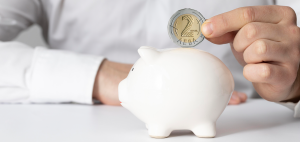Over the last two years, I have begun to pay more and more attention to the topic of personal finance. The reason for this increased interest is due to the fact that we started a family and I was no longer the only person I had to take care of. So, I had to try to differentiate between business income and personal income. I had to think more about savings and personal finances to provide more security and stability for me and my family.
As a person who has my own business, almost immediately after graduating from university, I used to take dividends from my companies – just as much as I needed to. And I reinvested most of the profits back in the business. What I realized was that one has to pay for oneself and that the approach I followed was not the most correct from the point of view of personal finances.
Therefore, in this article I decided to pay attention to some basic principles in the personal finances management, refracted through my experience and views.
Why did I remove all my credit cards?
One of the first things I did was close all my credit cards. Until two years ago, I actively used them for various purchases, and only then covered my obligations. When I began to monitor more closely the expenses I make and to structure my budget, I realized that on a monthly basis I paid a considerable amount to cover interest and other fees from the credit card funds used. Until then, I hadn’t noticed that using a credit card was actually a significant expense per year. This made me think seriously and I decided to close them down and save that money. My way of shopping has not changed, but my bank charges have decreased.
Cost optimization
A basic principle in personal finance is to control expenses so that they are not too large compared to income. Therefore, one of the important first steps in personal finance management is to analyze all expenses, whether personal or family budget. The purpose of this type of analysis is to assess which of them are really important and necessary and which you can save.
Among the fixed costs that many households have are those for television, internet and telephone, for example. But if you haven’t spent time on TV in a long time, you don’t have to pay an expensive subscription for many additional channels. Instead, if you don’t want to give up TV altogether, optimize your costs by choosing a more limited subscription, which will also have a lower monthly fee. You can apply the same principle with any similar type of fixed costs. The ultimate goal is to eliminate unnecessary costs, which will allow you to set aside more money to save.
Savings are important
Savings are important for your personal finances. It is recommended that you spend between 10% and 20% of all your income in the form of savings to have funds in case of emergencies and uncertain periods – such as job loss, car damage, etc. Many people in active age set aside funds for retirement to ensure a stable income and even after they are no longer able to work and receive a salary. I recommend George S. Clayson’s The Richest Man in Babylon, where you can learn about basic financial principles that are still valid today.
Income and expense tracking
Keeping a detailed statement of income and expenses is another thing you can do. On the one hand, this gives you a clear idea of where your money is going, and on the other hand, it allows you to analyze your behavior in terms of the money spent and what you spend most often. By doing this analysis, it is easier to make an informed decision about what costs you could limit and what you can save.
Often, when we receive more income, we tend to increase the amounts we spend. The downside is that this can lead to a situation where costs start to exceed revenues – especially if the revenue we receive is not constant.
One of the easiest ways to keep track of your personal finances is by using a mobile app. I personally use the Money Lover app and find it extremely useful because I can easily keep track of how much money I have spent and how much I have received on a monthly and annual basis. This makes it much easier to analyze income and expenses, and I can anticipate various expenses in the coming months or analyze information from previous years.
Another good option is to create an Excel spreadsheet where to describe your income and expenses, dividing them into separate types. How detailed the table will be is entirely up to you. However, keep in mind that the more detailed you describe your income and expenses, the more detailed analysis you will be able to do later.
Discipline is the basis for us to build good financial stability. It definitely takes time to get in the habit of entering every transaction you make, no matter how small and insignificant it may seem. But I guarantee you that this is an effort that will pay off.
Should we leave the money under the mattress?
When we talk about savings, an important factor that people tend to underestimate is inflation – every year it reduces the value of your savings.
Let’s illustrate this with a simple example. According to Statista, in 2019 the annual inflation rate in the USA was 1.81%. This means that if at the beginning of 2019 you had saved $100, then at the end of these savings you will be able to buy goods and services worth $98.19. For every $100 you have, you lose $ 1.81 of their value due to inflation. The bottom line is that if you keep your money unusable in the form of cash, it will lose value year after year.
If you have decided to keep your money in a bank, you should keep in mind that interest rates on deposits are currently extremely low – between 0%-1%. This makes bank deposits meaningless, both because of maintenance fees and because of inflation, which is higher than interest rates.
Another thing that is very important for savings is in what currency they will be. You should keep in mind that exchange rates vary. Therefore, as the exchange rate falls, so does the value of your savings.
The way to keep your savings and even increase them is by investing them in different types of investments. For example, real estate, stocks, precious metals, cryptocurrencies, antiques and others. One of the valuable lessons I learned in my first year at university is that one of the important principles of finance is diversification. Simply put, this means not putting all our eggs in one basket. Or to invest in different asset classes in order to reduce the risk of a bad investment. But to do it successfully, you need to have the necessary knowledge about the different types of possible investments.
Learning more about personal finance management
My last piece of advice is to take the time and attention to improve and learn in this direction, because the better you know the principles and know how to manage your personal finances, the more awareness and financial stability you will gain. In the uncertain times in which we live, the proper management of our resources is an extremely useful and valuable skill.







